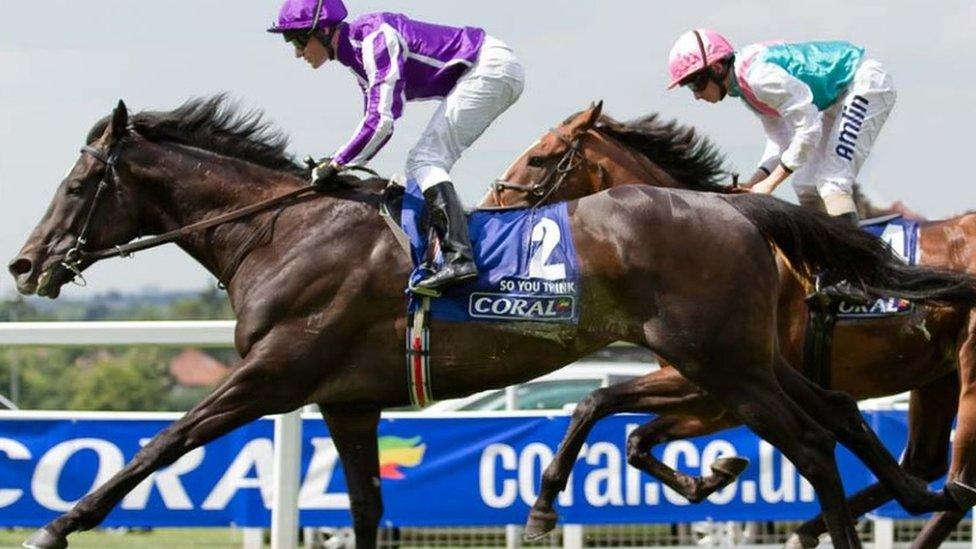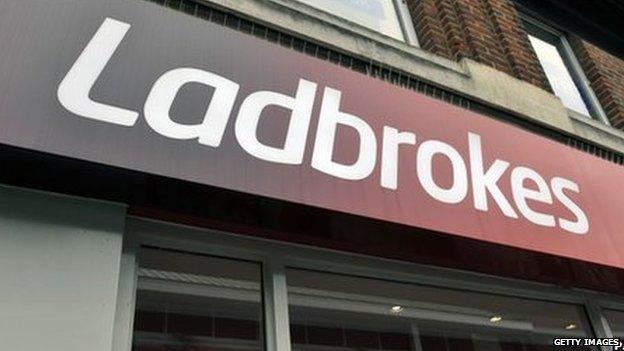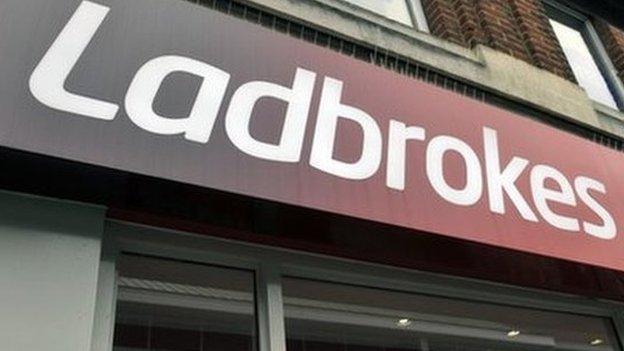Ladbrokes-Gala Coral deal clearance may depend on shop sales
- Published

Bookmakers Ladbrokes and Gala Coral may have to shed hundreds of stores if their proposed merger is to go ahead, the competition watchdog has said.
The Competition and Markets Authority said a merger of the UK's second and third largest bookmakers may restrict competition on the High Street.
About 350 to 400 shops may have to be sold "for the merger to be conditionally cleared", the CMA said.
The CMA has given until 13 June for responses to its provisional findings.
Ladbrokes operates 2,154 betting shops in Great Britain and 77 in Northern Ireland, while Gala Coral operates about 1,850 betting shops in Great Britain.
The combined group would make it bigger than current market leader William Hill.
Martin Cave, who is chairing the CMA's inquiry, said: "We've provisionally found that the merger between two of the largest bookmakers in the country may be expected to reduce competition and choice for customers in a large number of local areas.
"Although online betting has grown substantially in recent years, the evidence we've seen confirms that a large number of customers still choose to bet in shops - and many would continue to do so after the merger.
"For these customers, competition comes from the choice of shops in their local area and it's they who could lose out from any reduction of competition and choice."
The CMA said it was aiming to publish its final report by the end of July.

Ladbrokes said: "This is a significant step and our focus now will be on agreeing the shop disposals to satisfy the CMA." Ladbrokes shares had jumped 6.5% by the close of trade on Friday.
Gala Coral said it noted that the CMA was "provisionally minded to clear the proposed merger" and that it would continue to work with the regulator on ways to achieve final clearance.

Analysis: Frank Keogh, BBC Sport racing reporter:
The face of Britain's betting shops has transformed in the last 20 years - from smoky boltholes with horse racing dominating proceedings to shiny multi-screen sport outlets where fixed-odds betting terminals are a big earner.
While critics say the casino-style machines have encouraged problem gamblers, the bookies insist staff are trained to look out for issues.
The bottom line is the rise of the machines has helped keep many of these shops open in a modern-day wagering world where online gambling has mushroomed.
And while some shops look destined to be casualties, this proposed £2.3bn merger shows there is plenty of money still to be made in the British betting industry.

Analysts say the merged company will still have a dominant position even if many shops have to be sold.
"We expect substantial cost saving will be possible because there will be vast areas of overlap and unnecessary duplication of functions across the combined business," said Steve Clayton, head of equity research at Hargreaves Lansdown.
Ladbrokes agreed the terms of a £2.3bn all-share merger with Coral in July, and the company's shareholders backed the deal in November.
Gala Coral has been owned by a group of private equity firms, including Apollo Global Management, Cerberus Capital Management, Anchorage Capital Partners and Park Square Capital, since 2010, when it collapsed under £2.5bn of debt.
Under the terms of the deal, those private equity owners will own 48.25% of the new company's shares, with the remainder being held by Ladbrokes shareholders.
- Published11 August 2015

- Published24 July 2015
